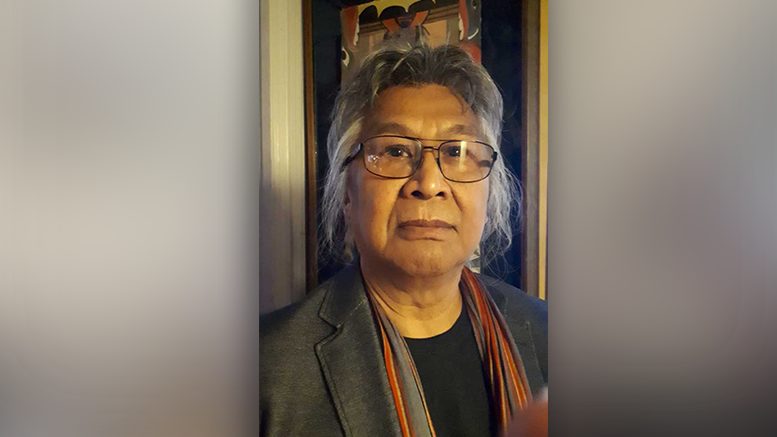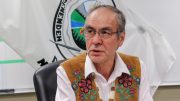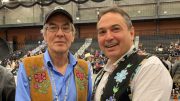The future of the Dene Nation is unknown.
“When I became the National Chief . . . I saw the Dene Nation was fragmented,” says Dene National Chief Norman Yakeleya.
Ever since Yakeleya was elected chief in 2018 he says the nation was split, and communities were not working together.
The Dene Nation is undergoing a “constitutional resurgence,” after noticing the divide between generations, adds Yakeleya.
In return, Yakeleya and his executive team have completed the first draft of a new unity document under the constitution.
No need for a national leader
The year was 1970, a group of men from the NWT called themselves the Indian Brotherhood.
Feeling the pressures of the proposed Mackenzie Valley pipeline and other surrounding developments in their communities, the men banded together and formed the Dene Nation – a political organization, representing the five tribes.
The Dene Nation operated under the mandate, to protect the rights and values of the Dene people.
Until the early 1990’s when the “unity of the Dene collapsed,” says Stephen Kakfwi, former chief of the Dene Nation.
“We were no longer fighting together for a single agreement to regain our land and seek self-government,” he adds.
Kakfwi attributes this time to be the natural dissolve of the Dene Nation.
“The nation has lost the reason for its original existence,” says Kakfwi, adding it “ceased to be relevant.”
Kakfwi describes the Dene as more of a confederacy.
Because the Gwich’in, Tłı̨chǫ and Sahtu regions already secured land agreements, independent of the Dene Nation, Kakfwi says “they have no particular need or use for the national office or the national leader.”
Kakfwi believes everybody has turned internally to their communities and tribal affiliations.
What does it mean to be Dene?
Yakeleya says it’s time to rework the framework on what it means to be Dene.
“We are operating on an old constitution that doesn’t fit today’s society,” he says.
Yakeleya plans to re-structure and in turn re-unify the distinct communities of the NWT by implementing a new constitution.
The new constitution will focus on blending old and new ideology in hopes of keeping the Dene Nation alive and relevant.
The Dene Nation is made up of executive and regional councils that represent the Denesuline (Chipewyan), Tłı̨chǫ (Dogrib), Deh Gah Got’ine (Slavey), K’ashot’ine (Hareskin) and Dinjii Zhuh (Gwich’in), says John McFadden, spokesperson for the Dene Nation.
Yakeleya, ultimately, wants to know if the Dene Nation should stay together.
Uniting generations
In late November, the Dene Nation hosted an Elders and youth workshop to better understand the needs of the community and gather some perspective on what the future holds for Dene people.
This workshop was held in the Sahtu region.
This generational divide between Elders and youth is getting worse, Yakeleya says.
Language, culture and ways of life are being lost, he adds.
“The youth haven’t been brought up like the elders,” he adds, “the Elders help give us direction.”
The Dene Nation says this is just the first of many workshops in redefining the Dene.
“Life is changing, the land is changing,” Yakeleya says.
The Dene Nation has established an Elders council to allow for this transition.
Separate councils are being organized to mobilize the conversation – a youth council and a woman’s council is next, says Yakeleya.
Yakeleya confirms a draft of the new constitution has been written by the constitution review commission.
The next step, he says will be in bringing it to the chiefs in the communities.
Yakeleya says the new constitution should be available by July of next year and that he will be applying for the federal government’s nation rebuilding initiative to help secure his vision for a new and improved Dene Nation.
“I see the future, we’re bigger than we think we are,” he says.
Kakfwi criticizes Yakeleya for taking two years to complete the draft.
“It’s self-evident,” Kakfwi says, “the answers have been in front of us for 30 years.”
Kakfwi calls for decisive leadership now – enough talk.
It’s a matter of identity
Gordon Yakeleya, the uncle of Norman Yakeleya, has been appointed from the Sahtu region to represent the Dene Nation on its Elder council.
“We’re trying to pass our knowledge onto the younger generation,” he says, for the preservation of the Dene Nation.
“Our young people don’t understand who they are,” he adds.
Gordon reminds us that “we’re losing our Elders,” and the value they bring to the future of the Dene is unmatched.
Gordon will play a primary role in the birth of a new constitution for the Dene Nation.
Mariah Caruso is a digital journalist, originally from Toronto, Canada. She graduated from the University of Toronto with a Hons. Bachelor of Arts and completed her Journalism post-grad at Sheridan College. She has an insatiable appetite for life, storytelling, connecting to the people, and getting to the heart of the issue.
On her spare time, you can find her at your local coffee shop writing songs, poetry and prose or at the gym out-lifting men.
If you have a story idea, feel free to send her an email at mariah.caruso@cklbradio.com or call 867-766-2552 Ext 108








